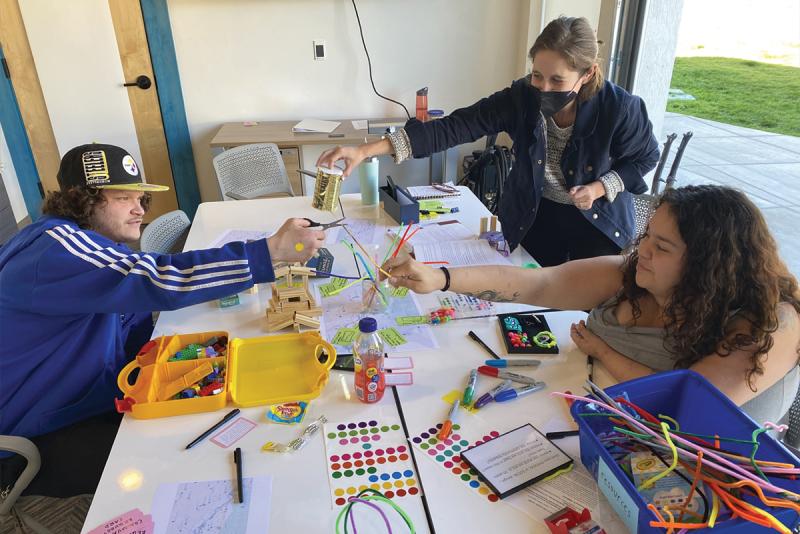Gaining Insight through Geographic Interviews and Game Play
The second and third components of the project aimed to reveal those deeper insights, Littman says. The second part entailed geographic interviews conducted by Littman, Jennifer Wilson (PhD ’21) and PhD student Colleen Cummings Melton and co-analyzed by PhD candidate Brendon Holloway. Littman asked PSH residents to take her on a tour of the building and share their feelings about different spaces along the way. Participants also used stickers and a map to indicate their favorite spaces and places where they felt most and least comfortable, safe and connected.
Designed by Shopworks Architecture, the building is a recent exemplar of trauma-informed design intended to promote healing for people who have experienced homelessness. The interviews provided insights that the architects are already applying in other projects, Littman says. For instance, Laurel House residents experienced the echoes in the building as loud and chaotic, which felt unsafe. As a result, the architects are revisiting the acoustic plans for other projects. Participants also described what Littman terms “contested spaces” — places where they felt both the most connected but least safe, such as the building entrance, where they might encounter people they don’t want to interact with. Participants preferred locations where they could choose what to do and who to spend time with, along with spaces where they could be both isolated and connected at the same time, such as nooks nestled into walls of the common room, far from the entrance, where they could see and be connected to everything going on around them yet at the same time be removed.
“That nuance of being both together and alone is something that I don’t think would have come out in another methodology,” Littman says. As she toured spaces with residents, “Having that visceral and embodied feeling myself helped me to understand more as a researcher.”
Third places are often spaces where people with marginalized identities experience oppression, Littman explains. “They should experience belonging and connection, but they don’t because of social norms and policing.” Take public parks, for example, where people experiencing homelessness are often moved along for the comfort of others. For the final component of her dissertation research, Littman wanted to partner with PSH residents to reimagine third places in a way that would work better for everyone, including for them.
Because “play is stripped from the lives of people who grow up so fast,” Littman says, she also wanted the research to be fun. So, in a months-long process, she co-created a game. Littman elicited initial feedback in the Social Work Health Futures Lab, where she was a 2020–22 fellow. She hosted a design session with artistic collaborators, then “iterated and iterated.” She explored a variety of games at PlayForge, a local game shop where she tested a pilot version of the game. Littman also tested the game with fellow PhD students.
In October 2022, Littman played the game with 23 Laurel House residents. Milligan co-facilitated the game-play sessions, and Holloway and MSW student Becca Berry helped to analyze the data. Through the game, PSH residents communicated that third places must offer opportunities for agency and individualization, meet everyday needs and be explicitly inclusive, Littman found. Notably, Littman discovered that prevailing theory around third places centers the needs of people who already have their needs met — not those who are most marginalized. That is something that will change in Littman’s preferred future.
Using a game as a research method “allows for a lot of different kinds of brains to share their wisdom,” Littman says. For instance, one resident created a rectangle with googly eyes and colorful puffballs. It represented a dance club with an adult ball pit, and the googly eyes were the “eye in the sky” watching to make sure everyone was safe and okay. “That brought us to new meaning we might not have gotten to with another method,” Littman says. “The power of imagination that was possible through games and play was really exciting.”
As she sought to develop insights that could inform future PSH projects, Littman also sought to redefine research rigor through her work. “I’m defining another measure of rigor as engagement and accessibility. If we’re not able to engage people in an accessible way, we’re not able to get helpful answers.”
For example, Littman says, the research team struggled to keep participants engaged in the first phase of research and ultimately lost around half of participants to attrition over 1.5 years. For the game-based inquiry, however, 23 participated in study over two days. “That level of engagement was unheard of in our study,” Littman says.
Littman’s dissertation research was recognized with a 2023 Society for Social Work and Research Doctoral Fellows Award, and in July, she will join the University of Utah College of Social Work as an assistant professor. She is particularly excited about the interdisciplinary and creative opportunities there, including the potential to partner with faculty and students in the university’s architecture and planning school. In the near term, she plans to continue publishing from her dissertation. Longer term, Littman aims to continue innovating in research methods and working to redefine rigor.
“A lot of the structures and systems that have been around for so long are cracking open,” Littman says. “My research harnesses that moment of cracking open to imagine what else is possible.”





